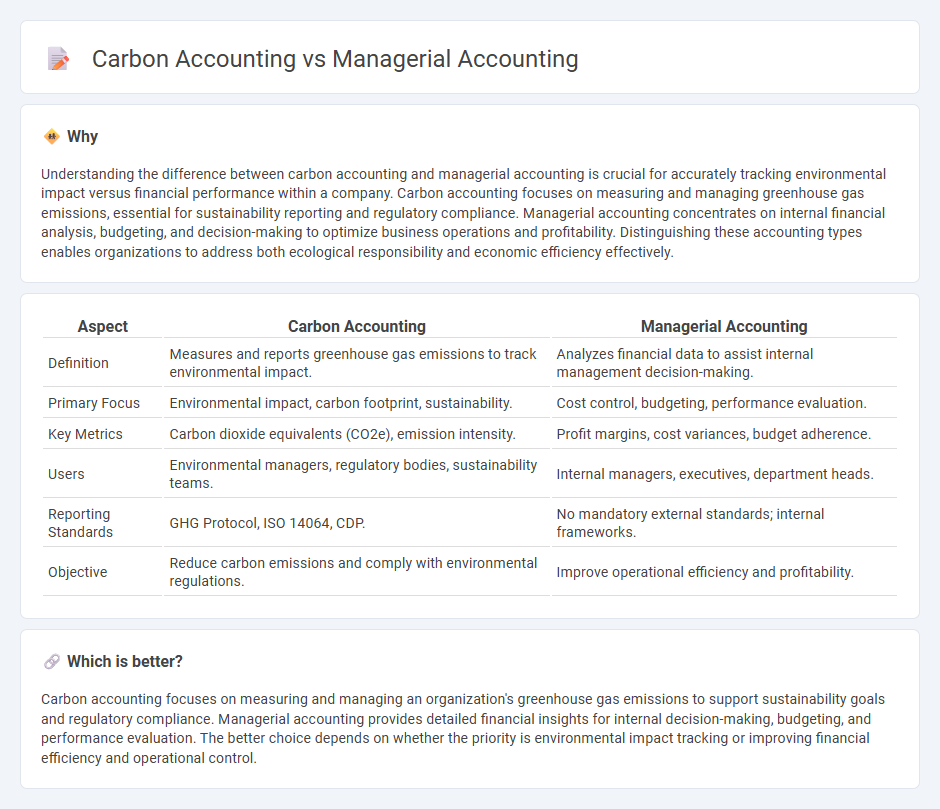
Carbon accounting quantifies greenhouse gas emissions to support environmental sustainability and regulatory compliance, while managerial accounting focuses on internal financial analysis to aid business decision-making and optimize operations. Both practices involve data collection and reporting but serve different strategic purposes--carbon accounting emphasizes ecological impact, whereas managerial accounting centers on economic performance. Explore further to understand how integrating these accounting methods can enhance corporate responsibility and profitability.
Why it is important
Understanding the difference between carbon accounting and managerial accounting is crucial for accurately tracking environmental impact versus financial performance within a company. Carbon accounting focuses on measuring and managing greenhouse gas emissions, essential for sustainability reporting and regulatory compliance. Managerial accounting concentrates on internal financial analysis, budgeting, and decision-making to optimize business operations and profitability. Distinguishing these accounting types enables organizations to address both ecological responsibility and economic efficiency effectively.
Comparison Table
| Aspect | Carbon Accounting | Managerial Accounting |
|---|---|---|
| Definition | Measures and reports greenhouse gas emissions to track environmental impact. | Analyzes financial data to assist internal management decision-making. |
| Primary Focus | Environmental impact, carbon footprint, sustainability. | Cost control, budgeting, performance evaluation. |
| Key Metrics | Carbon dioxide equivalents (CO2e), emission intensity. | Profit margins, cost variances, budget adherence. |
| Users | Environmental managers, regulatory bodies, sustainability teams. | Internal managers, executives, department heads. |
| Reporting Standards | GHG Protocol, ISO 14064, CDP. | No mandatory external standards; internal frameworks. |
| Objective | Reduce carbon emissions and comply with environmental regulations. | Improve operational efficiency and profitability. |
Which is better?
Carbon accounting focuses on measuring and managing an organization's greenhouse gas emissions to support sustainability goals and regulatory compliance. Managerial accounting provides detailed financial insights for internal decision-making, budgeting, and performance evaluation. The better choice depends on whether the priority is environmental impact tracking or improving financial efficiency and operational control.
Connection
Carbon accounting integrates with managerial accounting by enabling organizations to quantify, analyze, and manage their greenhouse gas emissions alongside traditional financial metrics. This connection supports sustainable decision-making, cost control, and regulatory compliance through precise tracking of carbon-related expenses and investments. Incorporating carbon data into managerial accounting systems enhances overall corporate strategy by aligning environmental impact with financial performance.
Key Terms
Managerial Accounting:
Managerial accounting centers on providing detailed financial and operational insights to internal management, enabling informed decision-making, budgeting, and performance evaluation. It focuses on cost behavior, resource allocation, and financial forecasting to optimize organizational efficiency and profitability. Explore deeper into managerial accounting techniques and applications to enhance strategic business management.
Budgeting
Managerial accounting emphasizes budgeting as a tool for internal planning, cost control, and performance evaluation within an organization. Carbon accounting focuses on budgeting carbon emissions, helping businesses set reduction targets and allocate resources to meet sustainability goals. Explore how integrating both budgeting approaches can enhance financial efficiency and environmental responsibility.
Cost Analysis
Managerial accounting emphasizes detailed cost analysis to support internal decision-making, budgeting, and performance evaluation within organizations. Carbon accounting focuses on quantifying greenhouse gas emissions and their associated costs, helping companies manage environmental impact and comply with regulatory requirements. Explore the distinctions in cost analysis methodologies between managerial and carbon accounting for comprehensive financial and environmental strategy insights.
Source and External Links
Managerial Accounting: Everything You Need To Know - Managerial accounting involves skilled accountants using financial data and analysis to support internal business decision-making focused on planning, strategic decisions, and leadership, including cost management, budgeting, performance management, and capital investment analysis.
Managerial Accounting - Definition, Objective, Techniques ... - Managerial accounting provides detailed internal reports, budgets, and cost analyses that help management understand financial performance, make resource and pricing decisions, and manage risk and opportunities for growth and competitiveness.
Managerial Accounting Made Easy - Managerial accounting combines business information and organizational strategy with financial data to produce internal reports and recommendations that assist executives in guiding company operations and decision-making.
 dowidth.com
dowidth.com